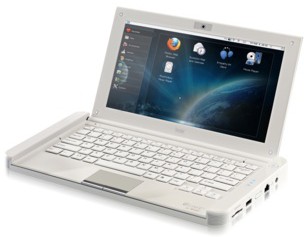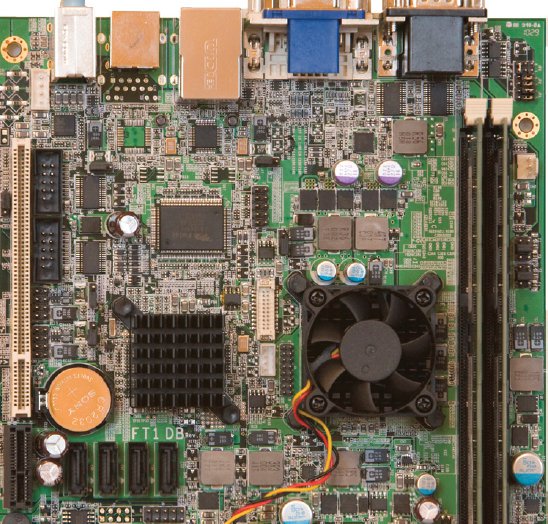Hercules, a subsidiary of Guillemot Corporation, announced two new eCAFÉ netbooks based on Freescale i.MX515 @ 800 Mhz (ARM Cortex A8) that run a custom Linux distribution and feature a dipswitch for flipping to other user-loaded Linux or Android operating systems: eCAFÉ Slim HD – 229 USD: LED screen: 10.1 inch, 1024*600, high brightness Storage: 8Gb Flash (iNAND), extensible up to 72Gb ARM CortexTM A8 FreescaleTM i.MX515 @ 800 MHz processor RAM: 512 Mb WiFi N technology Battery: 2400 mAh (7.4V) for 4.5 hours’ battery life Comfortable “chiclet” keyboard with flat, separate keys – 88% of a standard keyboard 0.3MP webcam with built-in microphone Connections: 3x USB, 1x Headset, 1x Microphone, 1x LAN RJ45, 1x DC-in 12V, 1x External card reader: SD/MMC/SDHC, 1x Internal card reader: SD/SDHC DIP Switch Weight: 1.9lbs / 0.86 kg eCAFÉ EX HD – 269 USD: LED screen: 10.1 inch, 1024*600, high brightness Storage: 16Gb extensible […]
New Digital Media Processor: Conexant CX92755
Conexant announced a new single-chip media processor for multimedia display products such as digital signage, home automation/security and user interface control. The CX92755 is based on ARM™ Cortex-A8 processor and NEON™ single instruction, multiple data (SIMD) engine with Linux and Android development support. The highly integrated SoC also includes an advanced HD video codec and graphics processor, integrated L1 and L2 cache, a PCI Express™ interface and DDR3 memory, The CX92755 integrates peripheral functions including a Class-D amplifier with speaker and line-out, a microphone input, back-light regulator, power supply controller and touchscreen controller. The SoC also includes an embedded high-performance graphics processor, which supports display list processing, alpha blending, and color key control for advanced user interface operation and display effects. the CX92755 also support the major network connectivity standards such as Wi-Fi®, 3G, Bluetooth® and integrated Ethernet. The SoC also integrates Conexant’s HSSD/Smart DAA® (Direct Access Arrangement) interface, and […]
Installing Linaro ARM Cross Toolchain on Ubuntu
You can easily install Linaro arm cross-compiler on Ubuntu 10.04 (Lucid), 10.10 (Maverick) and 11.04 (Natty) as follows: sudo apt-get install gcc-arm-linux-gnueabi This will install Linaro cross-toolchain version 4.4 on Ubuntu 10.04 and 10.10, and version 4.5 on Ubuntu 11.04. You can check the installation worked by checking the cross-compiler version jaufranc@CNX-TOWER:~$ arm-linux-gnueabi-gcc -v Using built-in specs. Target: arm-linux-gnueabi Configured with: ../src/configure -v –with-pkgversion=’Ubuntu/Linaro 4.4.4-14ubuntu4′ –with-bugurl=file:///usr/share/doc/gcc-4.4/README.Bugs –enable-languages=c,c++,fortran,objc,obj-c++ –prefix=/usr –program-suffix=-4.4 –enable-shared –enable-multiarch –enable-linker-build-id –with-system-zlib –libexecdir=/usr/lib –without-included-gettext –enable-threads=posix –with-gxx-include-dir=/usr/arm-linux-gnueabi/include/c++/4.4.5 –libdir=/usr/lib –enable-nls –enable-clocale=gnu –enable-libstdcxx-debug –enable-objc-gc –disable-sjlj-exceptions –with-arch=armv7-a –with-float=softfp –with-fpu=vfpv3-d16 –with-mode=thumb –disable-werror –enable-checking=release –program-prefix=arm-linux-gnueabi- –includedir=/usr/arm-linux-gnueabi/include –build=i686-linux-gnu –host=i686-linux-gnu –target=arm-linux-gnueabi –with-headers=/usr/arm-linux-gnueabi/include –with-libs=/usr/arm-linux-gnueabi/lib Thread model: posix gcc version 4.4.5 (Ubuntu/Linaro 4.4.4-14ubuntu4) You can also install the latest version 4.5 (recommended) on Lucid and Maverick: sudo add-apt-repository ppa:linaro-maintainers/toolchain sudo apt-get update sudo apt-get install gcc-4.5-arm-linux-gnueabi If you are using an ARM platform running Ubuntu 10.10 or higher, you could also use the native GCC compiler. sudo apt-get install […]
Cross compiling Berkeley DB for ARM and MIPS
Following my blog entry about Databases for Linux Embedded Systems, here are the instructions to cross-compile Oracle Berkeley DB. First download the source code of the latest version of Berkeley DB (version 11gR2 – 11.2.5.1.25). You’ll need to register on Oracle website first on the download page http://www.oracle.com/technetwork/database/berkeleydb/downloads/index.html to download http://download.oracle.com/otn/berkeley-db/db-5.1.25.tar.gz (with AES encryption) or http://download.oracle.com/otn/berkeley-db/db-5.1.25.NC.tar.gz (if you don’t need encryption). Extract the source code: tar xzvf ../Downloads/db-5.1.25.tar.gz Configure and build the source code. I’ll use mipsel-linux-gcc, but any other cross-compiler could be used. cd db-5.1.25/build_unix ../dist/configure –host=mipsel-linux CC=mipsel-linux-gcc RANLIB=mipsel-linux-ranlib STRIP=mipsel-linux-strip AR=mipsel-linux-ar –prefix=/home/jaufranc/edev/lib/db-11g make make install The full berkeley DB package is 79MB: jaufranc@CNX-TOWER:~/edev/lib/db-11g$ du –max-depth=1 -h 6.6M ./lib 308K ./bin 72M ./docs 176K ./include 79M . However, you won’t need the include and docs directory in your embedded target. So you do not need to copy those. You may or may need the utilities in the bin file. The […]
AMD G-Series SDK and Development Boards
Earlier this year, AMD announced its new Embedded processors G-Series aimed at set-top boxes, smart tv, digital signage, point of sales, media servers and more in order to compete with Intel Atom solutions as well as ARM based processors. Please refer to the link above for an overview and details about the 5 processors of the AMD G-series: T56N – Dual core @ 1.6GHz with Radeon HD 6310 GPU T48N – Dual core @ 1.4 GHz with Radeon HD 6310 GPU T40N – Dual core @ 1.0 GHz with Radeon HD 6250 GPU T52R – Single core @ 1.5 GHz with Radeon HD 6310 GPU Today, I’ll discuss about the development boards and software development kits available for this platform. AMD G-Series Development Boards and Reference Designs AMD Provide two reference designs and one development board: AMD Embedded G-Series Platform Mini-ITX Reference Design. No details are publicly available as this […]
Netgem’s IPTV 2.0 Home Cloud SDK
Netgem announced the release of its “Home Cloud” SDK based on IPTV 2.0 open architecture. Here’s an excerpt from the press release: Paris, France March 15 , 2011 Netgem, an IPTV technology leader, has announced it has made its Home Cloud software development kit (SDK) available to application developers, Internet service providers and operator partners. Netgem is further developing its partner ecosystem to enable third parties to take advantage of its IPTV 2.0 open architecture. This application framework is designed for the development of live and on-demand TV and multimedia applications. Using the open and fully documented APIs telecom operators and their partners can develop their local ecosystem of applications and services to differentiate their offering from competitors. Since Netgem is a pure technology vendor it does not interfere with the economics of the relationship between operators and developers, who are able to share 100% of the revenue. The full […]
Qemu Linaro Versatile Express Image on Ubuntu 10.10
I’ve installed qemu-linaro and run an ARM image based on the instructions on https://wiki.linaro.org/PeterMaydell/QemuVersatileExpress. I used Ubuntu 10.10 desktop edition. First, install the Linaro images tools: sudo apt-get install linaro-image-tools Download the Linaro release and versatile hardware pack: wget http://releases.linaro.org/platform/linaro-n/nano/alpha-3/linaro-natty-nano-tar-20110302-0.tar.gz wget http://releases.linaro.org/platform/linaro-n/hwpacks/alpha-3/hwpack_linaro-vexpress_20110302-0_armel_supported.tar.gz You can download another hwpack for omap3, i.mx51, pandaboard, beagleboard, ST U8500, etc.. if needed at http://releases.linaro.org/platform/linaro-n/hwpacks/alpha-3/ Download the source, extract it, then configure, build and install qemu linaro: wget http://launchpad.net/qemu-linaro/trunk/2011.03-1/+download/qemu-linaro-0.14.50-2011.03-1.tar.gz tar xzvf qemu-linaro-0.14.50-2011.03-1.tar.gz cd qemu-linaro-0.14.50-2011.03-1 ./configure –prefix=/usr make sudo make install Make sure the prefix is set to /usr in order to overwrite any previous version of Qemu (It installed qemu linaro in /usr/local/ instead in my case). Failure to do so may generate the following error during linaro-media-create: qemu: fatal: cp15 insn ee1d6f70 Instead of compiling qemu, you can install qemu-linaro with apt-get (this will avoid possible version issues between linaro-media-create and qemu): sudo add-apt-repository ppa:linaro-maintainers/tools […]
Cross compiling SQLite for ARM and MIPS
Following my blog entry about Databases for Linux Embedded Systems, here are the instructions to cross-compile SQlite. First download the latest version of SQLite amalgamation with autoconf script (version 3.75): wget http://www.sqlite.org/sqlite-autoconf-3070500.tar.gz Extract the source code: tar xzvf sqlite-autoconf-3070500.tar.gz Configure and build the source code. I’ll use mipsel-linux-gcc, but any other cross-compiler could be used. cd sqlite-autoconf-3070500 ./configure –host=mipsel-linux –target=mipsel-linux –prefix=/home/jaufranc/edev/sqlite-mips make make install At this point the library is correctly configured and installed, so you’d just need to copy the relevant files to your target board (skip include and share directories and libsqlite3.a) . Let’s check the size of the required files: ls -l ../sqlite-mips/bin/ -rwxr-xr-x 1 jaufranc jaufranc 125513 2011-03-14 14:21 sqlite ls -l ../sqlite-mips/lib/libsqlite3.so.0.8.6 -rwxr-xr-x 1 jaufranc jaufranc 2087584 2011-03-14 14:21 ../sqlite-mips/lib/libsqlite3.so.0.8.6 sqlite binary is 122.57KB and the dynamic library 2038.65KB. Let’s see if we can optimize the binary size with compilation flags and by disabling some […]







